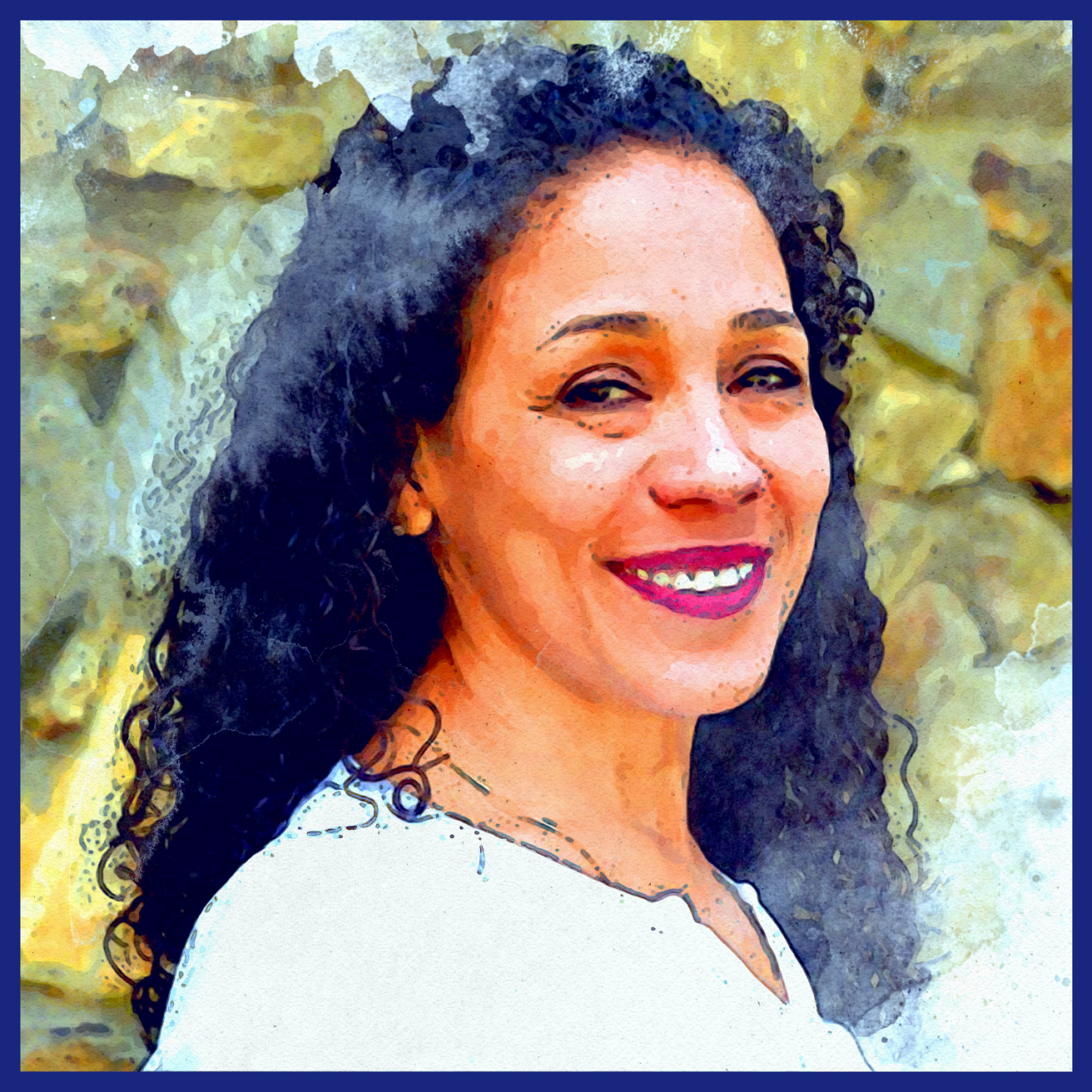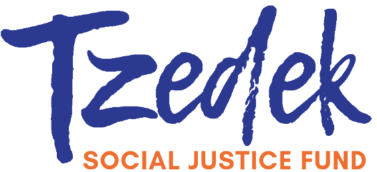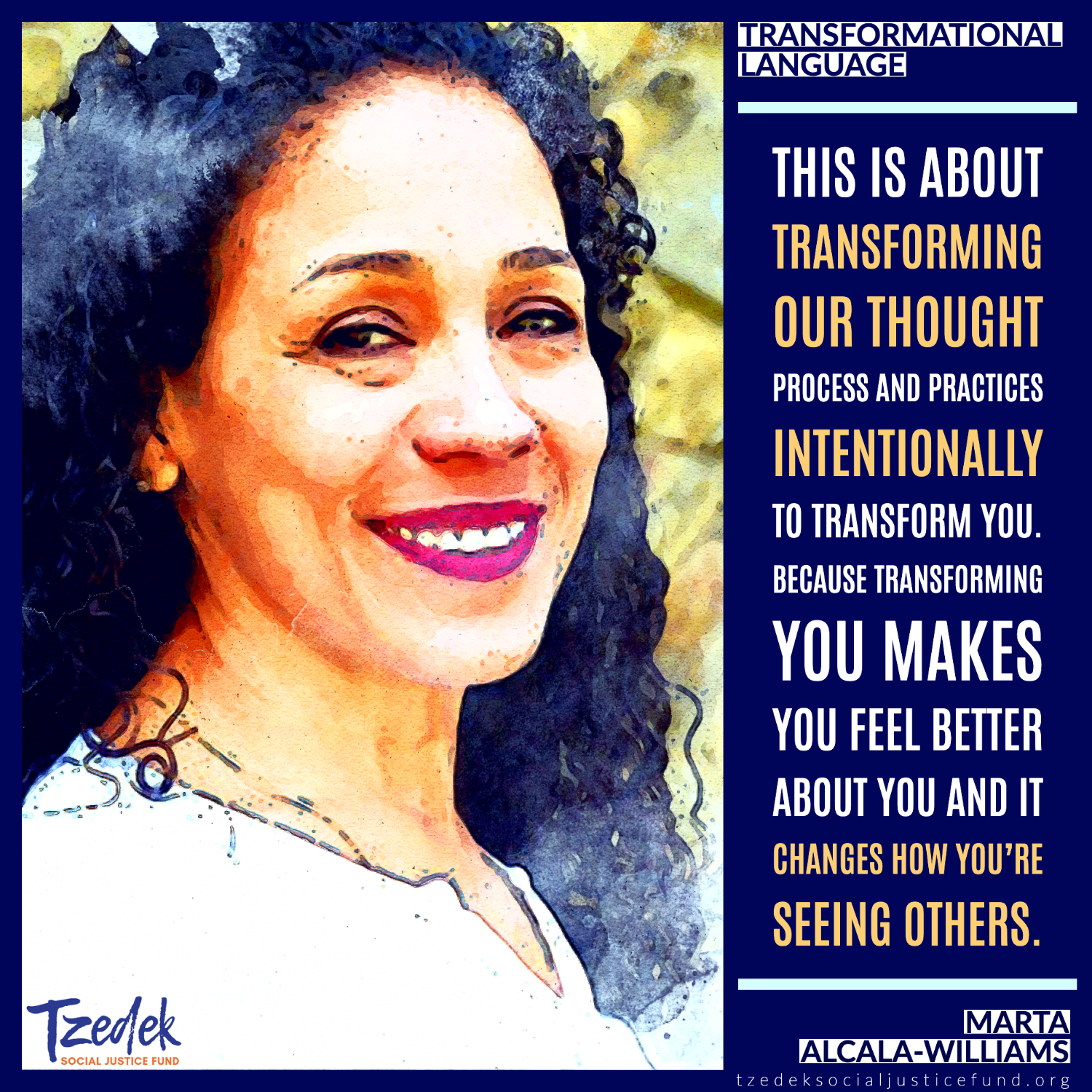Available in Español
Words matter. At Tzedek, we have learned that language impacts how we think about and do our work. Changing our relationship to power has required finding new ways to talk about money, relationships, and legal requirements. Thinking about who is the subject of a sentence and who is the object has revealed so many unspoken assumptions of philanthropy.
Our deep thinking about language was inspired by Marta Alcala-Williams. She has been inviting people, primarily in the education system, to use, what she calls, Asset+Justice Based Thinking and Practice (a framework that has emerged and grown in conversation with Dr. Sam Kaplan, Ashley Cooper, and Paul Gorski).
Here we talk to Marta about her work, and we share one of Tzedek’s internal communications guides, inspired by Marta’s work. Our commitment is to name power in the service of transforming power-over dynamics.
Tzedek: Tzedek was inspired by your work mapping justice and asset based thinking in the school system. Can you share how the idea for justice and asset based thinking emerged? How have you seen justice and asset based language shift power dynamics in ways that move towards liberation?

Marta Alcala-Williams: Justice and Asset Based Thinking and Practice grew out of Marvelous Math Club. There was a desire to have a math presence at Pisgah View [a housing complex in Asheville, NC]. UNCA Students were already coming to Pisgah View to offer math tutoring. Some students would drop in to get math support, but we could see something was off. So I asked Dr. Kaplan to share the flier with me, and it read “Free Homework Help.”
If you are Black and you are part of the “achievement gap” narrative and you are living in Pisgah View–would you want to get off the bus and go to Free Homework Help, which makes you feel like you’re broken? This might work for white students, but we could see what was happening. Black students are labeled as bad kids. They were talked about with language like the achievement gap. This feels so gross! We changed the flier, and it switched. First we had 6 kids and then 10 and then 20, until we had 37 kids.
Why are we always asking if these kids need help? It takes so much from your integrity and your personhood–like without me, you can’t do anything. I started to notice what bodies did when we said certain things. What happens when we say “support” instead of help? What happens when we say “priorities” instead of needs? With each new sentence it felt like something new happened. We started practicing this. But over time we saw language become weaponized. We would say “I see you showing up as a leader.” And then we would hear teachers say, “Are you being a leader right now? That’s not how leaders behave.” That is using words as weapons.
Paul Gorski helped me see that you can change the language, but if you’re not changing your practice, what are you doing? He added the layer of justice. Our worry is that white people will memorize the list and not change their practice. That’s where Asset and Justice Based Thinking and Practice emerged.
Instead of focusing on what we’re lacking in these Eurocentric, white supremacist systems – the education system, the criminal justice system, the healthcare system–, we’re focused on that you are an amazing awesome human on this planet. I’m not “the slow kid.” I’m not “the disenfranchised kid.” That’s just my circumstances. I am an amazing human being that is experiencing poverty, that is experiencing homeless. My circumstances are what they are, and I can get out of it.
Eventually, asset based thinking and practice was transforming the math champions [the adult volunteers], and we wanted to support magical teachers who are wanting to deliver to each human who is in front of us. Teacher education trains them in white supremacy. This is the back-pack that was given to you. Can you go and see what each kid is requiring to grow and thrive, and carry this in your backpack instead?
Language that is transformational for our practice and our thinking is important. Historically what happens for people in white bodies is that “brain, brain, brain,” intellect kicks in. Memorize all the words, and then people show up in gross, harsh, and harmful ways.
This is about transforming our thought process and practices intentionally to transform YOU. Because transforming you makes you feel better about you AND it changes how you’re seeing others.
I’ve heard people talk about how this approach changed things in their home. How the way they do homework changes, how they teach their white kids to see how Black and Brown children are talked about and how to speak up to say–that’s not right. This is how we raise co-conspirator children.
LIBERATORY LANGUAGE PRACTICES
The suggestions below are offered to support our team to communicate in ways that more deeply align with our mission, vision, and values. These suggestions are not offered in the spirit of “These words are good and these are bad.” Rather this is a guide to encourage us to be thoughtful about the impact of our words, context, and relationship.
| INSTEAD OF… | CHOOSE… |
|---|---|
| DEFICIENCY, CHARITY, AND SAVIORISM LANGUAGE | STRENGTH-BASED LANGUAGE |
| Words that describe grantees and partners as lacking. “help,” “need,” “empower,” “communities we serve,” “provide” “Do you need interpretation? Do you need support?” Person-blame language or language that ignores systemic oppression. “High school dropout” “marginalized communities,” “disenfranchised neighborhoods” | Words that honor that everyone has resources and capacities. “Distribute,” “redistribute,” “partners” “What would support your full participation? What language do you use to most fully express yourself?” Language that holds the system accountable. “Students pushed to the margins” • • “Neighborhoods systematically excluded from access to city resources.” |
| LANGUAGE THAT DEFLECTS POWER | TRANSPARENT LANGUAGE |
| Vague and confusing language about organizational processes and decision making. “A decision was made.” “X isn’t possible.” “We’re using ‘best practices.’”** **Avoid “best practices.” Best practices according to who? | Name who made a decision. “The grantmaking team–Jennifer, Marsha, and Libby–along with 6 Asheville leaders who work in social justice movements and local nonprofits…” Describe how a decision was made. “The committee ranked applicants using the grantmaking checklists available on our website and collectively identified finalists.” |
| PUNITIVE LANGUAGE | INVITATIONAL LANGUAGE |
| Language that includes an implied threat. “If awardees do not X, then Y.” “Grantees must…” “Awardees are required…” | Extend invitations. “Grantees are invited to share feedback with Tzedek at an end of the year gathering.” When naming a legal requirement, be specific about what is required and why. “Per IRS regulations…” “We use annual check-ins to document our grantee relationships which are required by the IRS and the Mandel Foundation.” |
| JARGON + TECHNICAL LANGUAGE | ACCESSIBLE LANGUAGE |
| Academic and social movement language not widely understood by our audience. “Tzedek seeks to problematize philanthropy.” Acronyms Used in the Philanthropic Sector. “MYGOD” “DEI” | Language that is widely used. “Tzedek is changing how grantmaking is traditionally done.” Define any words or acronyms that may not be widely understood. “Multi-year general operating grants” “Diversity, equity, and inclusion” |
| WEALTH-CENTRIC LANGUAGE | REDISTRIBUTION LANGUAGE |
| Describing philanthropy as an act of goodwill. “Generous donor” “This would not be possible without the support of…” | Use language that honors the work of grantees over and above the act of giving money away. “As a funder we are redistributing resources to the community organizations who are experts in…” |
| DEHUMANIZING LANGUAGE | HUMANIZING LANGUAGE |
| Monolithic/Othering language. “the Latinx community,” “they,” “minorities,” “the X population” Possessive language. “our grantees” | Acknowledge that there is not a single community based on any identity. “LGBTQ communities” Language that emphasizes autonomy. “grantee partners” |

